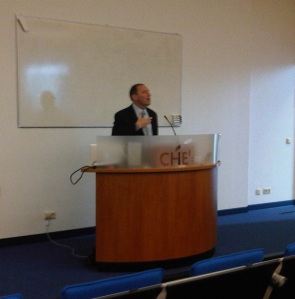Yesterday I attended an interesting symposium organized by Centrum for Israel Studies about Jewish followers on Jesus. The subtitle was: Bridge between synagogue and church?
Speakers:
Richard Harvey PhD, teacher at AllNations – Messianic Jewish theological Identity. Strength and weakness of the position of Messianic Jews.
Evert van der Poll, Professor at Leuven University – Messianic Jews, an enrichment for the Christian congregation?
Kees Jan Rodenburg – a challenge for defining a border between church and Jewish people.
Richard Harvey gave a very interesting lecture about the Messianic Jews. Are they the missing link? A Jewish form of Christianity and a Christian form of Judaism he said.
He was arguing that we all have a chair in which we sit down. We can sit together, we can sit at the opposite, or with quite a distance between, but in fact it is the same chair. Whether you are a “lawless” Christian or an orthodox Jew, you have something in common: a chair.
So I asked him a question: I see a chair of a Christian community and a chair of a Messianic community. Which should I choose? His answer was that I don’t have to choose, it’s the same chair. If you are on a specific side you’re doing good. In fact it’s a great pallet with many colors. The most important is to have your own authentic witness.
About the MJ he says they have a responsibility to the gentiles in church. And I agree on that. I would like to say that the MJ are an important voice to the church. They let the church see what they have and what they are missing. I think the Messianic Jews could show the church their roots. And the church might listen to that voice. Because this are the first signs of a great awakening. If the church doesn’t listen, than the same thing happens as with the Reformation: a parting of the ways. But the Messianic Movement has something special: They include both Protestants and Catholics, Jew and Gentile etc.
He also said he strongly belief in the election of Israel and the land. But in the covenant blessing Israel and the nations come together.
When hearing his lecture I guess he saw rather gentiles in the church with love to Israel then gentiles taking part of a Messianic Jewish community. I like his view of unity in diversity.
Evert van der Poll was arguing that the relationship of the church with the Jewish people must run via MJ. The church can support Messianic Jews, but be aware with money! Israeli orthodox Jews are very concerned about Western sponsored missionaries. On the question from one of the attendees (a fund raiser) that we have to help them, van der Poll responded: “Did you ever ask them to help you?” He answered “It’s not fair for asking the poor to help the rich.” Van der Poll: “But who is rich?” Wow, very good question!
Kees Jan Rodenburg was talking about the difficulties of defining the Messianic Movement. He believed that the subtitle (the bridge) was not a good one. Many agreed on it.
He shared his concerns about the naming of the Messianics. He rather speaks about Jewish believers of Jesus. In fact some orthodox Jews also bear the name Messianic.
I was asking: Does the church carrying things over the bridge to Judaism or do we accept things brought by Judaism to the church? I stressed that we have to look to the Jews and see what they have. That’s what Messianics do also. We surely can learn a lot from them. Yes we can learn a lot from the Jews.
Recent publications of the speakers:
Evert W. van de Poll, Sacred Times For Chosen People. Development, Analysis and Missiological Significance of Messianic Jewish Holiday Practice, Zoetermeer 2008
Richard Harvey, Mapping Messianic Jewish theology. A Constructive Approach, Milton Keynes, Colorado Springs 2009
Kees Jan Rodenburg, Joodse volgelingen van Jezus. Een overzicht in 40 vragen en antwoorden, Artios 2010





